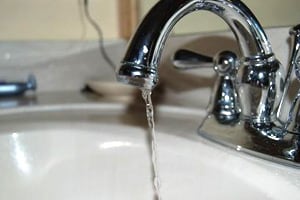
The chemical leak that contaminated the Elk River on January 9th not only left 300,000 people without water in West Virginia, many are now concerned about the chemical involved, a coal cleaning chemical whose long-term effects remain largely unknown. The governor declared a state of emergency and the use of water for drinking, washing, and […]
 The chemical leak that contaminated the Elk River on January 9th not only left 300,000 people without water in West Virginia, many are now concerned about the chemical involved, a coal cleaning chemical whose long-term effects remain largely unknown. The governor declared a state of emergency and the use of water for drinking, washing, and bathing was banned across nine counties.
The chemical leak that contaminated the Elk River on January 9th not only left 300,000 people without water in West Virginia, many are now concerned about the chemical involved, a coal cleaning chemical whose long-term effects remain largely unknown. The governor declared a state of emergency and the use of water for drinking, washing, and bathing was banned across nine counties.
At least eight class action lawsuits have been filed in Kanawha Circuit Court in response to the spill and many more lawsuits are expected to follow. All of these original lawsuits involve similar questions of fact and law over the chemical leak and water contamination, The West Virginia Record reported. The lawsuits were brought against Freedom Industries; four lawsuits also named West Virginia-America Water as a defendant.
Following the lawsuit filing, an expedited motion was made for the cases to be referred to a mass litigation panel; this based on the reasonable expectation that significantly more lawsuits are expected, given that 300,000 people were impacted, according to The West Virginia Record. The motion states, “The scale of the effects of this catastrophic event, including the potentially 300,000 effected water customers and potential class claimants, necessitate referral of these cases to the Mass Litigation Panel.” The motion also indicates that, based on the depth and breadth of claims filed, a Mass Litigation Panel is needed to manage the cases, The West Virginia Record wrote.
Harry F. Bell Jr. of the Bell Law Firm described the debacle as becoming a matter of accountability and responsibility. “This was a preventable incident,” Bell said. “This comes down to businesses and governmental agencies not doing their job, which has caused hospitalizations, personal injuries, and personal inconveniences that tug at you because so many are involved,” he added, according to The West Virginia Record.
The chemical involved, 4-methylcyclohexane methanol, is a coal cleaner that acts as a foaming agent. In the short-term, 4-methylcyclohexane reactions may include nausea, vomiting, dizziness, headaches, diarrhea, red or irritated skin, itching, rash, eye irritation, irritation of the nose and throat, and drowsiness. In laboratory testing the chemical caused unconsciousness in animals and death in a rat. According to the U.S. Centers for Disease Control and Prevention (CDC), the chemical affects the eyes, skin, central nervous system, and respiratory system. Long-term and other potential effects associated with the chemical remain unknown.
Just following the spill, West Virginia Governor Earl Ray Tomblin said that Freedom Industries did not report the leak to the chemical hot line. The chemical flowed into the West Virginia-American Water intake system, enabling the contaminated water to impact nine counties, HuntingtonNews.net reported.
The lawsuit alleges that, on January 9th, Freedom Industries was negligent and reckless; this led to the chemical leak at its Etowah River Terminal plant, which led to the chemical spill at the Elk River. The lawsuit also alleges that Freedom Industries had a duty to area residents and business owners and should have used reasonable care in appropriately running and operating the Etowah River Terminal plant and preventing chemicals from being released into the Elk River. Allegations also include that Freedom Industries was negligent and reckless and breached its duty when it caused the leak and allowed 4-methylcyclohexane methanol to be unlawfully released into the river, wrote The West Virginia Record.
As Bell explained, the nine-county water ban left people unable to wash their hands in the middle of the cold and flu season, The West Virginia Record reported. “So many people are affected and many of them can’t just take off and go somewhere until it’s over,” Bell said. “The people of West Virginia are mad and angry and they deserve answers,” he added.
Bell also said that that government officials should have been aware of what was taking place so close to its facility and should have issued a rationing order and closed the intakes. When the leak stopped, the intakes should have been opened, The West Virginia Record wrote. None of this occurred, according to Bell. “This is a real problem,” Bell said. “This is Charleston, West Virginia, not a third-world country. They didn’t plan appropriately for this and everything has been shut down because of it…. People deserve to know; they deserve to get answers.”


